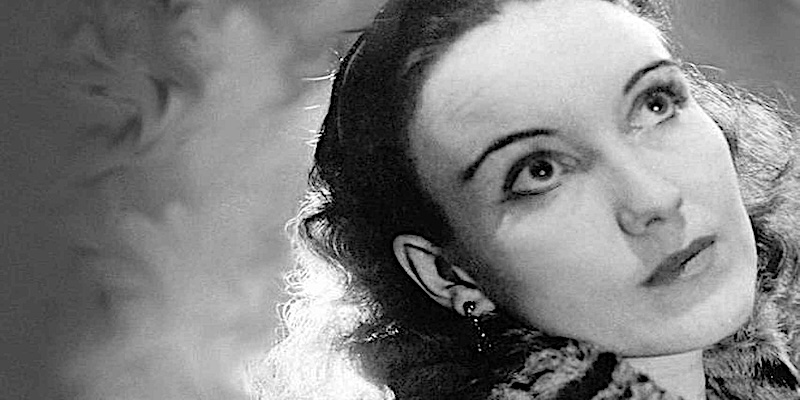The Barbara Comyns Novel That Got Too Real About Poverty, Giving Birth, and Women’s Lives
Avril Horner on the Extraordinary Wildness of “Our Spoons Came from Woolworths”
Barbara Comyns married the young artist John Pemberton in 1931 and their son, Julian, was born the following year. Intent on becoming a famous artist and resentful of being made a father in his early twenties, John began going to nightclubs and did little to support his wife and child. Barbara later thought of this period as “the poverty.”
When their marriage began to disintegrate, Barbara Comyns, like her husband, took lovers. Drawn by her beauty, Rupert Lee, John’s uncle by marriage and President of the London Group, started to take an interest in Barbara. She was flattered by his attention. Twenty years older than her, Rupert Lee was a sophisticated and experienced man who was very influential in London’s art circles. By the summer of 1934 they were lovers and in November 1935 he and Barbara had a baby girl.
Rupert Lee finally acknowledged that the child was his in 1936 but refused to leave his partner, Diana Brinton, and take responsibility for his daughter. Eventually Barbara Comyns had to accept that she was now the sole provider for her two children. The disintegration of her first marriage, and her lover’s failure to stand by her when she became pregnant with his child, had been bitter lessons in life but were to provide rich material for her second novel.
In the 1940s Barbara Comyns began drafting a book which drew on her life during the 1930s. Our Spoons Came from Woolworths, her second novel, is a thinly disguised tale of her life as a young wife and mother in bohemian London. Published by Eyre & Spottiswoode in the summer of 1950, its title reflects the fact that the young Pembertons had to make to do with second hand furniture and cheap cutlery.
Barbara insisted on the book being prefaced by a sentence that reads: “The only things that are true in this story are the wedding and Chapters 10, 11 and 12 and the poverty.” This note was almost certainly included so as to protect Rupert Lee and, more importantly, her daughter Caroline (who would not know the identity of her biological father for many years).
Our Spoons Came from Woolworths, her second novel, is a thinly disguised tale of her life as a young wife and mother in bohemian London.Despite this disclaimer, the novel accurately portrays several episodes in Barbara’s life at this time, including the deleterious effect of grinding poverty on her marriage and the trauma of giving birth to her son. After twenty-four hours in labour, during which Barbara was offered little pain relief and was subjected to the usual harrowing procedures undergone by women in labour in the 1930s (which included being dosed with castor oil and having her legs put in stirrups), she gave birth to a boy.
Her anger at the insensitive treatment she received in hospital, and her outrage at having to pay for it, would later be reflected in Sophia Fairclough’s experience of childbirth in Our Spoons Came from Woolworths:
People would not dream of doing such a thing to an animal. I think the ideal way to have a baby would be in a dark, quite room, all alone and not hurried….We did get two pounds from the insurance people I had been insured with when I had worked in the studio, but we had to give the hospital that. I can’t help feeling if we are all the King’s subjects the least he or the Government could do is to pay our birth expenses.
The grimness is often punctured by humor however—as when the unworldly Sophia mistakes the other pregnant women’s urine samples for lemonade during an antenatal appointment and asks where she can get some. Barbara’s vivid description of the humiliating ways in which women were treated in public hospitals in 1932 still makes the reader wince, though, and it is meant to.
Beneath the narrator’s cheerful naivety simmers an author’s indignation at society’s treatment of young mothers. When the novel was reprinted in the 1980s, Barbara was to express surprise that none of the reviewers “mentioned how awful it was having a baby before the National Health Service.”
That authorial candidness about the experience of childbirth also informs Barbara Comyns’ description of Sophia Fairclough’s relationship with her lover, Peregrine Narrow, described in the novel as “a distinguished looking, middle-aged” art critic separated from his wife Mildred, a character clearly based on Rupert Lee. Peregrine listens intently to everything Sophia says as if it were ‘very precious’ and Barbara portrays her fictional counterpart’s gullibility with wry amusement.
This had never happened to me before, and gave me great confidence in myself, but now I know from experience a lot of men listen like that, and it doesn’t mean a thing; they are most likely thinking up a new way of getting out of paying their income-tax.
These lines were written by an older Barbara who, in her early forties, was reflecting on a more naive and younger self with both compassion and humor. She also presents Sophia’s disappointment in her lover Peregrine Narrow—similar to her own disenchantment with Rupert Lee—with an understanding not available to her at the age of twenty-eight: “Now, looking back, I realize he was very romantic and sentimental, but at forty-seven he hadn’t the energy or initiative to take on new responsibilities.”
American readers have always taken Barbara Comyns to their hearts more readily than British readers.That older woman is also prepared to write about the way in which her younger self was introduced to sexual pleasure. If the relationship between Sophia and the experienced Peregrine in Our Spoons Came from Woolworths reflects that between Barbara and Rupert Lee, it seems likely that she experienced sexual fulfillment for the first time in her life not with her husband, but with her lover:
Some time later, when I realized I had been unfaithful, I didn’t feel guilty or sad; I just felt awfully happy I had had this experience, which if I had remained a ‘good wife’ I would have missed, although, of course, I wouldn’t have known what I was missing. I felt quite bewildered. I had had one and a half children, but had been a kind of virgin all the time. I wondered if there were other women like this, but I knew so few women intimately it was difficult to tell.
Although she deals with female orgasm elliptically here (reviewers seemed not to notice it), Barbara Comyns was one of the very few women novelists to address that topic in 1950. It is also one of the rare occasions when she wrote about sex, albeit obliquely. Many years later she confided to her friend the novelist Ursula Holden that she thought authors often found the subject difficult and that their unease showed in the writing. ‘I once thought of hiring someone to do a few pages that I could insert here and there’, she added – but she resisted the temptation.
There are plenty of sudden shocks in Our Spoons Came from Woolworths (including the doctor’s suicide and the tragic death of Sophia’s little daughter from Scarlet Fever) but the strange and disturbing power of the novel derives not from its plot or its characters, or any gothic undertones, but from what Maggie O’Farrell has described as “the disparity between tone and content.” The disjunction between the potential tragedy facing Sophia Fairclough, and the jaunty frankness with which it is related, results in a stylistic incongruity that unsettles the reader. A less fanciful and a more realistic novel than her first book Sisters by a River, Our Spoons Came from Woolworths was an extraordinary achievement for a writer still finding her feet.
Reviews, however, were mixed. One of the first to appear, by Julian MacLaren-Ross in the Times Literary Supplement, was sharp and condescending. Having praised Sisters by a River, which MacLaren-Ross described as “less like a novel than a piece of family history recorded by a precocious child conversant with the novels of Gertrude Stein,” he went on to dismiss Our Spoons Came from Woolworths as a “rather commonplace story” in which Sophia, the main character and narrator, is “shallow, foolish and capable of the complete ruthlessness which is a sign of retarded emotional growth.” He ended the review by extending this criticism to the author:
Like her heroine, Miss Comyns does not appear to have quite grown up yet; she is still at the age of confusing selfishness with honesty, but her growth to spiritual maturity should be awaited eagerly by all those genuinely interested in the future of the English novel.
More than one reviewer criticized the way Barbara finished the book, including Lionel Hale who thought that “the happy ending which Miss Comyns claps on her chronicle of poverty somewhat resembles a marshmallow stuck on a heavily salted almond”—a comment that, according to her son, cut Barbara to the quick.
Other critics were kinder. The reviewer for The Irish Times noted that “Her eye is sharp, her humor pretty well continuous. It is, in fact, a rather good account of the destruction of happiness by poverty” while Eric Young wrote in the Sheffield Daily Telegraph “If the naivety is calculated, she is an extremely skillful writer; if not, she is still a very good one.”
Barbara was beginning to discover that her novels would often divide readers and reviewers. She was cheered, though, by the American edition of Our Spoons Came from Woolworths, which arrived in December and which she described to Diana Brinton as “all done up in gold and leather for Christmas, it looks just like a family bible or Wordsworth’s poems.”
The next year started well. Barbara was delighted that Our Spoons Came from Woolworths was warmly received in the States. The Chicago Tribune reviewer described it as “a curiously attractive novel; its style and the story it tells are strangely reminiscent of Moll Flanders.” In a review that was widely syndicated, the Buffalo Courier-Express critic commented that the book’s “uncompromising realism will invoke laughter and tears in all but the most cynical reader” and The New Yorker reviewer noted that “The author resembles an English Anita Loos.”
American readers have always taken Barbara Comyns to their hearts more readily than British readers.
______________________________

Barbara Comyns: A Savage Innocence by Avril Horner is available via Manchester University Press.




















